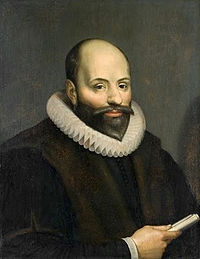Jacobus Arminius
| Jacobus Arminius | |
|---|---|

Bailly, David (1620), Jacobus Arminius.
|
|
| Born | October 10, 1560 Oudewater, Utrecht |
| Died | October 19, 1609 (aged 49) Leiden, South Holland |
| Nationality | Dutch |
| Education | Leiden University |
| Occupation | Pastor, theology professor |
| Spouse(s) | Lijsbet Reael |
| Theological work | |
| Era | Reformation |
| Tradition or movement | Arminianism |
| Main interests | Soteriology |
| Notable ideas | Prevenient grace |
Jacobus Arminius (October 10, 1560 – October 19, 1609), the Latinized name of the Dutch theologian Jakob Hermanszoon from the Protestant Reformation period, served from 1603 as professor in theology at the University of Leiden. He wrote many books and treatises on theology, and his views became the basis of Arminianism and the Dutch Remonstrant movement.
Following his death, his challenge to the Reformed standard, the Belgic Confession, provoked ample discussion at the Synod of Dort, which crafted the five points of Calvinism in response to Arminius's teaching.
Arminius, born in Oudewater, Utrecht, became an orphan while still young. His father Herman died, leaving his wife a widow with small children. His mother was killed during the Spanish massacre at Oudewater in 1575.
The pastor Theodorus Aemilius adopted Arminius and sent him to school in Utrecht, but died in 1574. Then Rudolph Snellius brought Arminius to Marburg and enabled him to study theology at the University of Leiden.
Arminius remained a student at Leiden from 1576 to 1582. Although he enrolled as a student in Liberal Arts, this allowed him to pursue an education in theology, as well. His teachers in theology included Calvinist Lambertus Danaeus, Hebrew scholar Johannes Drusius, Guillaume Feuguereius (or Feugueires, d. 1613), and Johann Kolmann. Kolmann is now known for teaching that the overemphasis of God's sovereignty in high Calvinism made God "a tyrant and an executioner". Although the university in Leiden was solidly Reformed, it had influences from Lutheran, Zwinglian, and Anabaptist views in addition to Calvinism. One Leiden pastor (Caspar Coolhaes) held, contra Calvin, that civil authorities did have jurisdiction in some church affairs, that it was wrong to punish and execute heretics, and that Lutherans, Calvinists, and Anabaptists could unite around core tenets. The astronomer and mathematician Willebrord Snellius used Ramist philosophy in an effort to encourage his students to pursue truth without over reliance on Aristotle. Under the influence of these men, Arminius studied with success and may have had seeds planted that would begin to develop into a theology that would later question the dominant Reformed theology of John Calvin. The success he showed in his studies motivated the merchants guild of Amsterdam to fund the next three years of his studies.
...
Wikipedia
